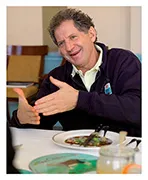When I spoke to him back in September, before he’d officially lined up his refreshing British GT cameo at Silverstone, Button admitted he’d been “going mad” this year not racing, for the first time since he was a little boy. At 40, Button might be 10 years older than Scheckter when he stopped, but he’s a very different man and is still going through the process of adapting to a post-F1 life.
“I didn’t have any direction to go with my life and work,” he admitted, “but there have been some really good opportunities in the past six months, which is great. I’m really looking forward to the future – but with everything I’m doing, running my own team [Jenson Team Rocket RJN], the TV work with Sky F1, it’s not about driving and I need to find out where that fits in. I have to race. I’m a racing driver. It’s always been my life and it’s what I’m best at.”
Button had just come back from a run when we spoke and remains in top nick, to an astonishing degree. Life begins at 40? Well, it certainly isn’t about to stop for a man who could race on in endurance racing – and even in IndyCar street and road races, if he can find a drive – for at least another decade. There are others who are pushing on even further. Yvan Muller has just finished second in the World Touring Car Cup at 51, and his old rival Gabriele Tarquini has absolutely no intention of quitting at the age of 58.

Vettel isn’t done just yet and will embark on a new chapter with Aston Martin in 2021
Kenan Asyali - Pool/Getty Images
Racing at the pinnacle in F1, of course, might be a different matter – although no one appears to have told 41-year-old Kimi Räikkönen. Then there’s Fernando Alonso’s impending return with Alpine in a year when he’ll turn 40 – and 15 years after he won his last F1 world championship… While at 35, Lewis Hamilton’s career conclusion will surely be defined by his desire and hunger to race on rather than his age.
And what about Sebastian Vettel? He’s a mere slip of a lad at just 33. But of all the current F1 ‘old guard’, it’s the four-time champion around whom the r-word has circled the most – purely because of his spiralling decline in form in the past couple of years. At times, it’s been painful to watch and I’ve found myself wishing him to quit, only because there’s something so desperate about seeing a great driver – which Vettel undoubtedly is – still tilting at windmills when his heart is no longer in it.
But that’s the point, isn’t it? It hasn’t looked much like it for quite some time, but Vettel must still be as hungry as he says he is if he’s willing to embark on a bright new start with Lawrence Stroll’s Aston Martin. If it’s just pride motivating him to press on, it might well come before another fall. But instead, it’s probably a simple case that, for all this intelligent man might have to offer the wider world outside of the cockpit, he’s no different to the rest of them: racing is what he does and all he’s ever done.
So I’m making a personal note to stop hassling him and others much older with the r-word. Life’s too short – even if racing careers no longer are – to keep worrying about the ending. Live in the present and press on regardless.





